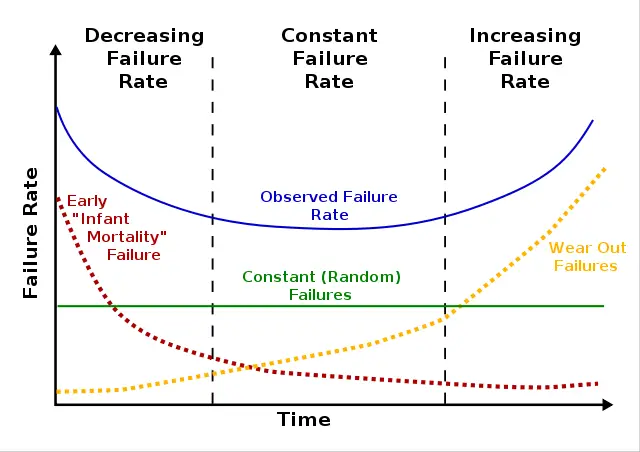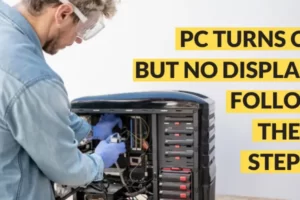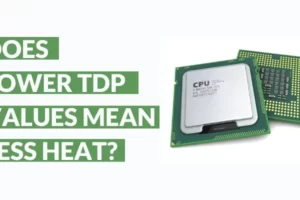So how long do PC parts last? There can be quite a few reasons why you would ask a question like how long does a PC last, how long will your laptop last etc.
One very obvious reason is the fact that PC parts aren’t cheap. When you decide you need a PC, the planning process starts at least a month before you hit that buy now button. 3 months in some cases or maybe even more in exceptional cases where GPU or memory prices take a hit.
Yeah, yeah, I am reminiscing those times when mining hit its peak and every available graphics card (especially AMD cards) were sniped like open season.
So, you want the best return for your hard-earned investment can be one reason why you may be inquiring about pc parts lifetime.
The other reason could be the rapidly changing pc hardware landscape.
This is as true for pc hardware as it is for smart phones. A new hardware is always around the corner.
Mark my words no matter how good you think is the time for building your PC the next few months will always feel better.
There is always that rumour about this new graphic card that will change the landscape, AMD is launching this new CPU that will blow Intel away (Well, in all truthfulness this actually happened with Ryzen) or memory prices are going to go down because something happened in China and the likes.
So, you may be pondering whether you should get a part cheap that has already been used for some time which you can then later for that shiny new pc hardware that is right across the corner.
Anyways, whatever your reason might be in wanting to know how long do pc parts last, I am pretty sure the information is important in your pc building process or for your knowledge base if nothing else.
Now one important thing to note with pc parts is that the question how long do pc parts remain relevant is as important if not more than how long do pc parts last. So, I will cover the topic from both these perspectives so that your understanding is wholesome and not fragmented.
So, let’s start with the most generic one.
How long do pc parts last?
The answer is every single hardware that goes in your PC usually have different lifetimes but, on an average, you can expect your PC part to last anywhere from 5 to 8 years. If the question is how long pc parts remain relevant, you can expect that on an average your pc parts should hold good for 2 to 5 years.
Now I hope you understand that the answer is subjective and heavily dependent on how you wish to use your PC.
For example, I still have a Pentium 4 PC from 2007 that rocks 2 GB of RAM and Window XP no problem.
Similarly, if you are building a gaming PC, because you are going to use highly rated parts for a satisfying gameplay, I am pretty sure it will last for at least 5 years.
How long will it stay relevant is a whole different question.
As a general-purpose computing system again at least 3-5 years but the gaming beast that it is now, will lose its teeth, don’t be surprised in the coming 2 years, of course by no fault of its own.
The hardware industry is seeing rapid advancements by the day and it the advancements are not showing signs of slowing down anytime soon, what with companies like Intel making a show every time they take the stage on CES.
So that was just an average estimate when we club all pc parts together.
But obviously not all parts are going to have the same lifetime, so if you are wondering how long do individual pc parts last, read on and by the end of this post, you will have all your answers.
Additional spicy articles I know will blow your mind and rock your world!
- How to build your own PC?
- How to choose the right monitor for your PC?
- How to choose the right motherboard for your PC?
- Definitive CPU buyer’s guide.
- How to upgrade your PC for gaming and productivity?
- Does SSD improve gaming performance?
How Long Do Motherboards Last?
Motherboards are going to be one of the most lasting hardware of your PC. Leaving aside hardware faults, short circuits and changing compatibilities with new CPUs, a thought of changing a motherboard usually comes with giving a serious thought to building a new PC given the fact that everything rests on it. On average motherboards can have a lifetime of 8-15 years.
Now once again we are talking about lifetime here and not how long a motherboard will remain relevant.
In the world of electronics, lifetime is usually good when compared with mechanical or heavy electrical equipment for the simple reason that they have fewer moving parts.
A motherboard is basically a seat on which everything rests. And because it doesn’t see any friction-based movement they generally tend to last long.
If you browse around for topics related to PC building you will definitely come across this phrase called backward compatibility.
It simply means that the upcoming iteration of CPU will still be compatible with the current gen motherboards.
When AMD released First Gen Ryzen CPUs they created a special place in pc hardware enthusiasts when they declared that the AM4 motherboard sockets will be viable till the year 2020.
Which basically meant you can pick a newer generation Ryzen CPU, install it on your old motherboard update the BIOS and enjoy the new spoils.
Intel users haven’t had luck on their side in this regard, because Intel’s subsequent launches Skylake, Haswell, Sandy/Ivy all required different motherboards.
Yikes.
One big reason so many people jumped ship from Intel to AMD among others.
Now addressing the other question, how long are the motherboards relevant for?
Well, motherboards usually get replaced when you dearly wish to upgrade to a better CPU and the motherboard doesn’t provide backward compatibility. So, a motherboard maybe relevant for as long as 4 subsequent years as is the case for AM4 socket motherboards (just BIOS update will be required) or a motherboard may go out of relevance if the CPU manufacturer decides you need a new socket for the new CPU. Intel users have experienced this pain in the recent past.
How Long Do CPUs Last?
CPUs are of course the most solidly established units in a computer system. With no mechanical moving parts, it sits nice and tight in a protected and cooled environment. Therefore, your CPU is most likely to go obsolete before it fails. If you have to give its lifetime a number, a CPU if not mishandled can easily last from 8 to 15 years.
For example, I still have two chips, Core 2 Duo and Pentium 4, from 2007 and 2009 that I know for a fact are intact and ready to act. Pity their surrounding and accompanying parts didn’t have that kind of perseverance.
It’s very rare to see a CPU fail from ordinary usage. Sometimes manufacturers relay a lifetime of 100,000 hours for marketing purposes which roughly translates to around 10 years. But as I said any CPU that you get today will likely see obsolescence because of competing parts before you see it fail.
One reason, that I have heard of, leading to CPU failures is overheating. But that is again a thing of the past. Newer chips now have sophisticated power management systems where a CPU isn’t allowed to run too hot. If the CPU reaches a critical temperature, an automatic throttle procedure gets initiated which reduces the clock (thus reducing temperature). A similar procedure can even initiate a whole system shut down if temperature reaches a level that can cause permanent damage.
Talking about CPU temps a rather more interesting question to ponder upon is how long do overclocked CPUs last?
Well, there isn’t a contrasting number that will clearly demarcate how long will an overclocked CPU will last. But you can expect it to last anywhere from 5 to 10 years. That’s again a rough number and the CPU will likely perform consistently (if overclocked properly) until it gets outperformed in competition or face obsolescence rather than going out of operation.
Because you are tinkering the with the fundamental specifications that the CPU came with, there is always an element of doubt when you are trying to overclock a CPU especially if you are a beginner with this kind of setting.
When you are trying to overclock a CPU what you are fundamentally doing is increasing the CPU multiplier which makes it run faster.
In order to clock the CPU higher, you will need higher voltage and thus the heat produced by the CPU will be higher.
However, if you have a proper cooling mechanism in place and do your research in knowing what is the recommended vCore for your particular CPU you can safely overclock your CPU to receive enhanced performance.
So, in essence, overclocking can reduce the lifespan of a CPU but if you do it right and have the necessary cooling mechanism in place (preferably liquid or AIO), the reduced lifespan would still be enough for the CPU to get obsolete before it stops functioning.
How Long Does RAM Last?
RAM or memory is once again a firmly seated hardware piece of your PC and as such doesn’t see any wear or tear similar to CPU. As far as part lifetime is concerned you can expect an average memory lasting for 8-10 years or even more. With memory just like CPU you will most likely upgrade your platform to say DDR5 before your DDR4 memory stops working because of its age.
There is an interesting observation regarding quality checks of memory. Many manufacturers claim that if a DIMM works beyond 6 months it will probably last for the next 15-20 years.
This claim is supported by what the quality assurance teams call as the “bathtub reliability curve“.
The curve is called so because its shape closely resembles a bathtub as you can see below.

What the graph depicts is that if a memory unit is going to fail there is a good chance that it will fail in the early test cycles of the product (first few months after memory is created).
The reason for the failure of the memory in this time period is due to the presence of undesired particles in the fabricated memory layer.
These undesirable particles may create a thin oxide layer that will result in the failure of the unit in the early test cycles.
So, vendors and manufactures make their memory units pass through a rigorous stress test involving high voltage and temperatures.
The units that pass the test have high success rates. That is why most of the time you will see manufacturers promise audacious lifetime warranties with memory units.
Because by the time they get faulty if at all they do, they will most likely get obsolete and the reason why you would want to swap or switch them is to get new sticks to match the other upgraded hardware (DDR4 to DDR5 for example).
The other end of the bathtub reliability curve represents failures induced due to silicon wafer wear. This usually happens around 10-year mark or more.
How Long Do GPUs Last?
When compared with other hardware units that are firmly placed in their seats like CPUs and Memory, Graphics card does contain moving parts and are subjects of more faults like capacitors going bad or erosion/melting of solders. Still on an average you can expect your graphic card (if you handle it rightly) to last anywhere around 5-8 years or more.
But once again, the real question here isn’t the lifetime of a graphic card but how long will a graphic card will be relevant for.
Ideally, your graphic card may even last a decade, however owing to the complexity of drivers, chances are manufacturers will stop providing driver support to cards older than 5 years.
On a similar basis, game developers may not take any guarantee on performance of cards running on legacy drivers.
Even if all of the above factors work in your favor, one factor that will be against you no matter what you do, after a certain time are the game demands.
Newer titles especially when they are newly released tend to gobble as much resources as you can throw at them.
Enhanced rendering algorithms, deepened textures, polygon count etc. usually go up with subsequent passing year and development cycle.
All these enhanced technologies of course require the graphics card to handle more computation and calculation load which can easily overwhelm an older graphic card leading to jitters, frame drops, lag and issues like that.
Therefore, a graphics card running out of relevancy is a bigger and more significant factor to consider than the exact years a graphics card will last.
How Long Does HDD Last?
With mechanical moving parts the Hard Disk Drives are one of the most fault prone pieces of hardware in your PC. While they are increasingly being replaced by SSDs given the fact that SSD prices have seen continuous dips over the years still many pc builds still use a hybrid storage, where an HDD usually acts as an archive storage. You can expect HDDs to last anywhere between 3 to 5 years on average.
Apart from mechanical failures happening due to wear and tear other possible reasons that may reduce the lifespan of a mechanical hard drive are power surges, firmware corruption, human error and overheating.
A failed hard drive may not necessarily mean that all data on the drive is irrecoverably lost. But usually whether it be internal hard drives, server drives or external hard drives 3 to 5 years is what you should expect them to last.
One great deployment to hard disk drives see is in RAID setups.
If you are a content creator like me, it always seems you are running out of space. In addition to having more space what is also needed is an arrangement where data redundancy and security is maintained.
RAID setups are a content creator’s best bet here.
And because HDDs are relatively cheap, even if a hard drive gets faulty in its lifespan of 3 to 5 years you can easily swap it for a new one without it causing a dent in your wallet while at the same time preserving your data.
How Long Do SSDs Last?
In times we are currently in if you wish to build or get a PC for yourself and if you ask around a bit in the regard, I can’t say anything about the other parts but everyone will agree on one front that whatever you do get an SSD. These storage devices with high read write devices are a topic of discussion as far as their lifespan is considered but you can easily expect them to last anywhere from 5 to 7 years.
SSDs are inherently different from HDDs in their structure and how they operate. While HDDs operate in a mechanical way that involves actuators, spinning platters, SSDs as indicated by their name are solid drives that operate using NAND flash memory chips.
While it has been a while since SSDs have become consumer grade storage solutions and almost everyone can get their hands on them.
In the entirety of the pc hardware landscape, SSDs are relatively new hardware units.
Manufacturers use different kinds of metrics to gauge how long SSDs will last. Most popular among them being TBW (Terabytes Written over time) and DWPD (Drive Writes Per Day).
If a manufacturer rates an SSD to have a TBW of 200, it implies that the drive can write 200 Terabytes of data after which the drive may need to be replaced.
DWPD similarly is a metric that dictates how many times will a user be able to overwrite on the available storage each day during its mentioned lifespan.
Meaning a 500 GB SSD with a rated lifespan/warranty of 5 years means you can write 500 GB every day on the hard drive for the period of the warranty after which failure may occur.
I also found this useful tool that can help you predict to a certain degree of accuracy what is going to be the useful life of your SSD on the basis of anticipated load.
With the advancement of technology, manufacturers are incorporating different techniques to ensure SSD failure and faults gets reduced.
So, don’t worry, if you are getting an SSD from good companies like Samsung or Crucial, your SSDs will work fine for at least 5 years or even more for your average tasks.
How Long Does A Power Supply Last?
Under normal operations a ‘good’ power supply unit should last anywhere between 5 to 8 years. However, you must stress the word good here because a power supply is the most sensitive, significant and potentially hazardous hardware unit of your entire PC. Therefore, it’s imperative you choose a good power supply with right standard and good ratings, even if it means you pay extra for it.
So, how exactly should one go about choosing the right power supply deserves a post of its own but doing your basic research on any product you have your eyes on should be the very least you can do.
While there are grades within a brand demarcating qualities of power supplies but it’s hard to wrong if you choose products from Seasonic, EVGA, Corsair CX and RM series.
Now I am very supportive of optimizing your picks so as to get the best possible parts on lowest price possible, but when it comes to Power Supply Units, they are not the parts to skimp out on.
This is the unit that will power everything and if it isn’t the source of stable and controlled power, it can not only destroy your other hardware units but can also be a potential power hazard.
So, power supply units are the ones you must check and double check upon.
Believe me you can still game well, if you choose a graphic card a tier under what you may want, but it is far better than living under that lingering doubt about is my power supply going to hold its own for times to come.
Therefore, in addition to looking at the warranty, that should guarantee at least 5-7 years of operation, go through a couple of detailed review posts from authentic sources about the particular PSU you are eyeing.
FAQs
I think I have considered the lifetime of most of essential hardware you will be needing if you decide to build your own PC.
I have ensured that the post has certain other subtle knowledge chunks you will need to ensure you are getting the right parts and consequently you are building a PC that will serve you the way it is supposed to.
So, although I have covered the topic how long do pc parts last comprehensively let me quickly answer a few other frequently asked questions around the topic that I think will be valuable for you.
How Long Does A Gaming PC Last?
Once again, the question can be looked at from two perspectives, how long does a gaming PC last and how long does it remain relevant. Because it is a gaming PC, I am pretty sure you will be choosing high-end hardware in the form of graphic card, PSU, CPU etc. so gaming PC should easily last for 5 years at the very least.
How long will a gaming PC remain relevant is a subjective question. So much will depend upon what hardware are you choosing right now, are there new parts that are going to be released soon, what kind of games and apps are you planning to deploy your PC to, and are you choosing your parts that you will soon look to upgrade.
In general, if you are choosing just the best of everything that is available out there, you can expect your gaming PC to be at the top of its game for 2-3 years. You will be able to extend this performance for 2 years or maybe more if you upgrade some or all parts in the future.
But once again, when you get new parts to go along with certain older hardware, there is a good chance it won’t perform as optimally as it would with newer parts for obvious reasons.
So, I look at it this way.
Once you have locked and bought the pc parts for your new PC build, the learning that you get while building it will give you an insight as to how long will you be able to stretch it with upgrades.
I would say, choosing the right parts now and systematically upgrading it, will render you get decent performance out of your gaming PC for about 5-7 years.
These posts will help.
- How to build your own PC?
- How to choose the right monitor for your PC?
- How to choose the right motherboard for your PC?
- Definitive CPU buyer’s guide.
- How to upgrade your PC for gaming and productivity?
- Does SSD improve gaming performance?
How Long Do Gaming Laptops Last?
While I have always been a proponent building a PC instead of getting a gaming laptop, in recent years looking at how the laptop industry is evolving, I have relaxed that advise to a certain extent. If you are well aware of what you need and choose the right laptop out of the sea of options available you can easily have a gaming laptop that will serve you decently for 3 to 5 years.
Once again for a given cost, a custom-made PC will usually outperform any laptop that you will pick for the same price.
However, in certain situations having that factor of portability and the convenience of gaming on the go (with a myriad of multiplayer games available) may justify getting a laptop instead.
How Long Do Gaming Laptop Batteries Last?
As far as lifetime of gaming laptop batteries is concerned it depends on hard is your laptop usage is and how much care you take while using it. For good gaming laptops when handled properly their batteries should serve you well for 3 years and maybe more.
If you are asking how long will a gaming laptop battery last in a stretch of gaming session, a laptop designed for gaming should give you 5 to 8 hours of gaming on high settings.
A good cooling mechanism is absolutely essential for a gaming laptop given the fundamental fact that gaming processes do tend to generate a lot of heat given they use so many PC resources.
So, a good cooling mechanism in place will not only ensure elongated gaming sessions but also increased lifetime of gaming laptops and their batteries.
With that we are at the end of these elaborate post on how long do PC parts last. I hope I was able to cover all essential aspects comprehensively.
If you have any other query or doubts regarding anything we have discussed thus far in the post, don’t forget to leave them down below into the comments section.
And while you are at it subscribe to the blog and also to my accompanying YouTube channel for receiving awesome content like this on a daily basis.
Take great care of yourselves and I will see you in the next one!
Tada!



